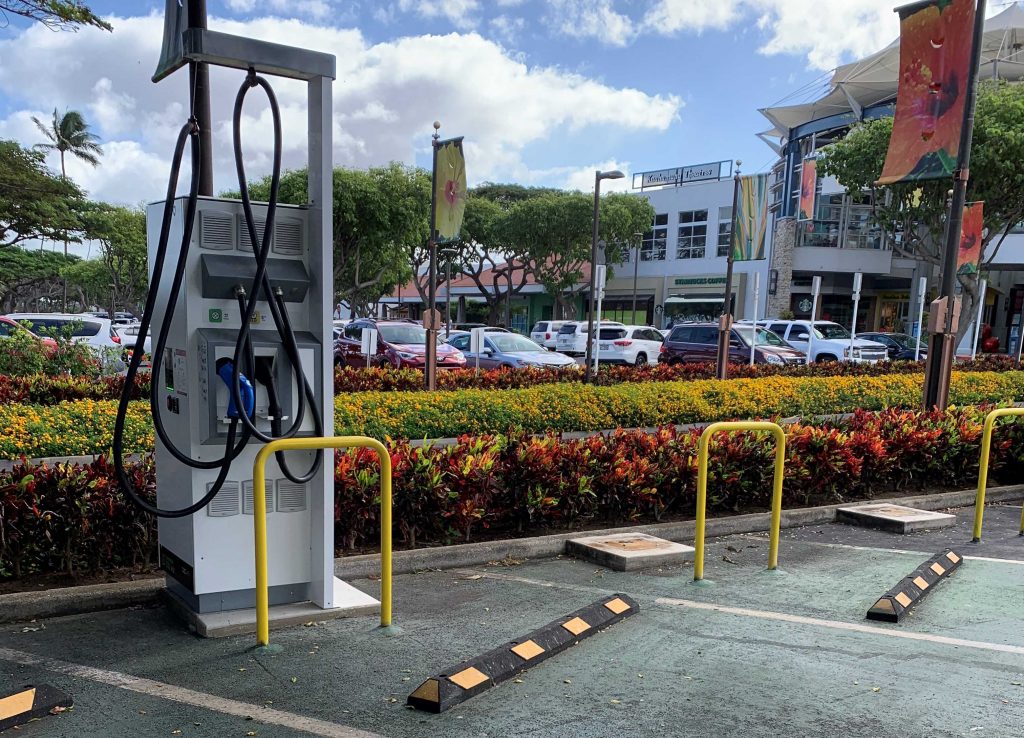
Hawaiian Electric has added seven new publicly-accessible, fast-charging stations for electric vehicle drivers on Maui and O‘ahu.
The new DC fast chargers can provide more than 40 miles of additional range for a typical electric vehicle in 15 minutes. They also incentivize drivers to charge during daytime hours with lower rates when renewable energy is typically abundant.
Hawaiian Electric now owns and operates 25 fast chargers with 13 on O‘ahu, six on Hawai‘i Island, five on Maui and one on Moloka‘i.
“Building reliable, convenient, public EV charging infrastructure will accelerate clean transportation and encourage more drivers to go electric,” said Aki Marceau, Hawaiian Electric director of electrification of transportation. “Transitioning to EVs will reduce emissions and allow us to use more renewable energy.”
In Hawai‘i, transportation uses nearly two-thirds of imported petroleum and discharges over half of the state’s greenhouse gas emissions. Providing utility-owned public chargers establishes a critical foundation when replacing fossil-fuel powered vehicles with cleaner, more efficient EVs. Currently, there are more than 13,000 registered EVs in Hawai‘i.
In partnership with the site owners, the new public chargers serve to broaden and solidify a third-party charging market in Hawai‘i.
“Upgrading our fast-charging station at our Lahaina Aquatic Center is a great example of how our county administration works together in partnership with our county council, county departments and Hawaiian Electric to meet our county’s clean transportation goals,” said Maui County Energy Commissioner Alex de Roode. “We look forward to continuing these partnerships in order to bring additional EV charging options to our community in the very near future.”
The new fast chargers support CHAdeMO (mostly used by EVs like the Nissan Leaf and the Tesla with their proprietary adaptor) and CCS (used by American and European EVs like the BMW i3 and as an option on the Chevy Bolt). Charging sessions can be initiated in multiple ways, including smartphone apps to credit cards.
The state’s four counties are committed to 100 percent public and private renewable-fueled ground transportation by 2045. In July 2020, Hawai‘i joined 15 states and the District of Columbia in a pledge to expand the market for electric medium- and heavy-duty vehicles. The goal is to ensure that 100 percent of all new medium- and heavy-duty vehicle sales are zero-emission vehicles by 2050. The interim target is 30 percent zero-emission vehicle sales by 2030.
Later this year, Hawaiian Electric plans to propose further expansion of its fast charger network. The company hopes to install more public chargers as well as conduct outreach to gain community feedback on driving habits, EV charging needs and preferred site locations.
The new charging stations locations:
Maui:
- Lahaina Aquatic Center, 245 Shaw St., Lahaina
- Pi‘ilani Village Shopping Center, 207 Pi‘ikea Ave., Kihei
- Pukalani Terrace Center, 55 Pukalani St., Makawao, HI 96768
- Queen Ka‘ahumanu Center, 275 W. Ka‘ahumanu Ave., Kahului, HI 96732
Oʻahu:
- Kapolei Commons (Replacement), 4470 Kapolei Parkway, Kapolei, HI 96707
- Waipio Shopping Center, 94-800 Ukee St., Waipahu, HI 96797
- Salt Lake Shopping Center, 848 Ala Lilikoi St., Honolulu, HI 96818
